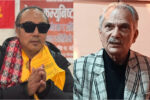LONDON: Twitter said on Wednesday that British Prime Minister Boris Johnson’s Conservative Party misled the public by changing the name of one of its Twitter accounts to make it look like a fact-checking service during a televised election debate.
The Conservative Campaign Headquarters press office account, followed by nearly 76,000 users, changed its name to “factcheckUK” from its usual “CCHQPress” and switched its avatar to a white tick against a purple background.
It made the change while Johnson was debating opposition leader Jeremy Corbyn, the Labour Party leader, on live television. The rebranded account tweeted graphics supporting statements from Johnson as “True” and criticized others from Corbyn.
“Twitter is committed to facilitating healthy debate throughout the UK general election,” a Twitter spokeswoman said.
“We have global rules in place that prohibit behavior that can mislead people, including those with verified accounts. Any further attempts to mislead people by editing verified profile information – in a manner seen during the UK Election Debate – will result in decisive corrective action.”
Full Fact, a genuine fact-checking charity, also criticized the Conservative tactic.
“It is inappropriate and misleading for the Conservative press office to rename their Twitter account ‘factcheckUK’ during this debate. Please do not mistake it for independent fact-checking service,” it said.
Labour said it was a “scam” that showed the Conservatives could not be trusted in government.
Conservative Party Chairman James Cleverly defended the move. “We made it absolutely clear it is a Conservative Party website … checking the claims” of Corbyn, he said.
The account description during the debate was “Fact-Checking Labour from CCHQ”. After the debate finished the account reverted to its regular Conservative Party branding.
Prior to the controversy, Twitter had pledged to make it easier to report misleading information about the voting process in Britain’s Dec. 12 election.
Twitter said last month it would stop all political advertising, making the British election one of the first major tests for the new policy.
(Agencies)









Comment